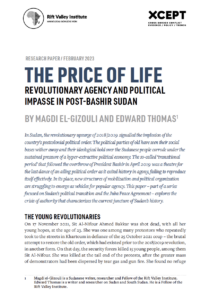In Sudan, the revolutionary upsurge of 2018/2019 signalled the implosion of the country’s postcolonial political order. The political parties of old have seen their social bases wither away and their ideological hold over the Sudanese people corrode under the sustained pressure of a hyper-extractive political economy. The so-called ‘transitional period’ that followed the overthrow of President Bashir in April 2019 was a theatre for the last dance of an ailing political order as it exited history in agony, failing to reproduce itself effectively. In its place, new structures of mobilization and political organization are struggling to emerge as vehicles for popular agency. This paper – part of a series focused on Sudan’s political transition and the Juba Peace Agreement – explores the crisis of authority that characterizes the current juncture of Sudan’s history.
This research paper is a product of the FCDO’s Cross-Border Conflict Evidence, Policy and Trends (XCEPT) programme, funded by UK aid from the UK government. XCEPT brings together leading experts to examine conflict-affected borderlands, how conflicts connect across borders, and the factors that shape violent and peaceful behaviour. The programme carries out research to better understand the causes and impacts of conflict in border areas and their international dimensions. It supports more effective policymaking and development programming and builds the skills of local partners.




